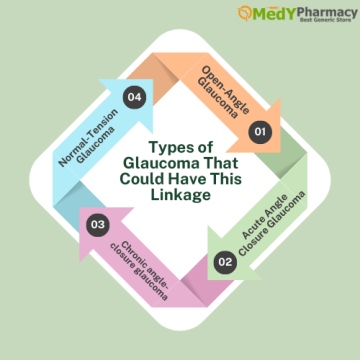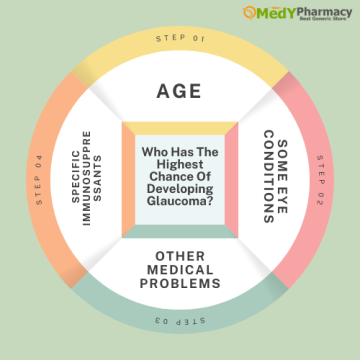Introduction:
Our vision is one of the most important components of our existence. It is our eyes that allow us to glimpse the lovely world around us.
However, several situations might have a significant impact on this eyesight. This is a severe vision problem. It can have a significant influence on how you live your life. Any type of eye problem is likely to cause substantial problems in your daily life.
Certainly, an illness like glaucoma, which might blind you, should be taken seriously. Your ocular health should be improved.
As a result, we’ll go over the important components of the condition. It might give you an early indication of whether you will face this problem just because someone in your family has had it. We will talk about its hereditary features, which are also very important.
Slowing glaucoma progression necessitates therapy with eye drops, lasers, or other ocular surgery, which is critical because optic nerve damage is permanent. An eye care expert will offer the appropriate treatment for the individual and the stage of the condition.
What Is Glaucoma?
This is a collection of eye illnesses that affect the optic nerve, which is the component of the eye that transmits what you see to the brain. This has no known origin, however, it is associated with an imbalance in eye pressure known as intraocular pressure (IOP). The imbalance is caused by an excess of fluid entering the eye, insufficient fluid exiting the eye, or an imbalance of pressures surrounding the optic nerve.
Pressure imbalance causes long-term damage to the optic nerve in the rear of the eye. When the optic nerve is injured, it is unable to adequately communicate what your eyes view to the brain, resulting in partial or complete vision loss.
Glaucoma refers to a group of eye illnesses characterized by progressive optic nerve damage. This results in irreversible eyesight abnormalities when nerve tissue is lost over time.
This sometimes has a hereditary component. Having a parent or another close family with glaucoma can also raise your chances of having it.
Learn about the genetic and inherited links to glaucoma, as well as what you can do to safeguard your eye health.
- Blind areas in your peripheral vision.
- Tunnel Vision
Is There A Genetic Component To This Condition?
Our genetics are inherited from our parents and subsequent generations. These DNA contain inherent info about how we will evolve as people.
This includes both the positive and negative aspects that our parents have borne. If either of your parents has glaucoma, you are at risk of developing it.
Yes, it does suggest that the condition is genetically influenced. Primary open-angle glaucoma is one of the difficulties that can arise. This shows the potential impact.
According to several research, families that have a history of these are more likely to pass the condition along to future generations.
Types of Glaucoma That Could Have This Linkage

- Open-Angle Glaucoma
Which is the most common, accounting for 90% of all cases. People sometimes are unaware they have this type of glaucoma because it grows slowly. This type of glaucoma, like all other types of glaucoma, can cause irreparable vision loss if not detected early with routine eye examinations.
- Acute Angle Closure Glaucoma
Angle-closure glaucoma, also known as acute glaucoma, is characterized by a rapid fluid obstruction of the iris (the colored area of the eye) that prevents fluid from draining out of the front. IOP rises quickly, resulting in eye discomfort, red eyes, and blurred vision. Which is a serious eye emergency that can cause blindness if not treated promptly.
- Chronic angle-closure glaucoma
Chronic angle closure glaucoma, like acute angle closure, develops when the iris shuts the eye’s drainage angle. This produces occasional increases in intraocular blood pressure, which can lead to optic nerve injury. This can happen with or without eye pain, and vision loss normally happens gradually over time, so it may go unreported.
- Normal-Tension Glaucoma
Normal tension glaucoma can occur even if IOP is normal. It could be caused by low blood pressure, but it is most likely caused by an imbalance of fluids surrounding the optic nerve, and the exact process is unknown. It is more difficult to notice and is usually discovered during a thorough optic nerve examination by an eye care practitioner.
Which is caused by an underlying ailment or injury that disrupts the eye’s drainage system. Secondary glaucoma can be caused by eye surgery, ocular damage, uveitis, corticosteroid medicines, and other medical diseases such as diabetes. It might manifest gradually or suddenly, depending on the underlying cause.
Complex illnesses, such as glaucoma, are likely to have several branches. Certainly, there are several conditions that a person can develop.
When it comes to hereditary links, not all glaucoma cases have them.
Only certain types of diseases may be linked to your DNA. For example, a POAG-like condition could occur as a result.
Congenital glaucoma may also have this propensity.
However, there are several secondary conditions that a person may develop. The chances of inheriting that type of glaucoma are quite small. As a result, this suggests that certain types of sickness may be related to your genetic history.
What Is Hereditary Glaucoma?
Genetics transmits hereditary glaucoma from one generation to the next. Mutations in certain genes important for the formation and operation of the eye’s drainage system, or outflow, which aids in the regulation of IOP, are to blame.
IOP is the pressure inside the eye that is maintained by a balance of aqueous humor production and drainage, a clear fluid that fills the front section of the eye. When the drainage system fails to work properly, the IOP rises, causing optic nerve injury and vision loss.
- Make extra tears
- Have clouded eyes
- Are sensitive to light
Different types of glaucoma
Although there are several types of glaucoma, the two most common are open-angle glaucoma and angle-closure glaucoma. Primary open-angle glaucoma is the most common and progresses slowly over time. Angle-closure glaucoma, on the other hand, might appear unexpectedly and is considered a medical emergency. Identifying the precise form of glaucoma is essential for understanding its progression and treatment options.
Pattern of Genetic Transmission
There is a strict pattern that the condition may follow, as found in investigations. For example, several investigations have discovered that not everyone with these traits in their genes develops glaucoma.
That instance, if a person has glaucoma, the chances of passing the disease to his or her child are not 100%. According to certain studies, only about half of the population is susceptible to the disease.
This does not imply that the person’s genetics do not include traces of the disease. However, just because something is genetically ingrained does not mean it is the cause of the disease. This is an observation regarding glaucoma and how it is inherited.
Can Glaucoma be treated?
Your eye doctor can help you treat glaucoma. The sooner doctors detect an issue, the more they can safeguard your vision and eye health.
Following an eye exam, your optometrist might propose a personalized treatment strategy. They can treat you in the clinic or refer you to a specialist if your glaucoma is severe.
- Prescription Eye Drops
- Oral Medicines
- Surgery
Is There A Family History Of Glaucoma?
It is possible to inherit both open-angle and closed-angle glaucoma.
Approximately half of persons diagnosed with primary open-angle glaucoma have a family history of the disease. Having a first-degree relative with primary open-angle glaucoma can raise your risk by up to nine times. And the more relatives that have the disease, the greater your risk.
According to some research, having a sibling with primary closed-angle glaucoma increases your risk of developing it by 13.6 times.
Family History of Glaucoma
If you have a family history of glaucoma, you should take preventative measures.
- Get regular eye examinations
If glaucoma runs in your family, begin receiving regular eye exams earlier than you would normally. An eye specialist can detect glaucoma in its early stages before it causes substantial damage.
- Knowing Your Family History
Knowing your family history might help you and your doctor make informed decisions regarding your vision care.
- Adopt a Healthy Lifestyle
Maintain a healthy lifestyle to improve your eye health. This includes eating a well-balanced diet high in vitamins and antioxidants, exercising regularly, and not smoking.
Genetic Influences on the Age of Onset
Genetics can play an important influence in predicting when a problem will arise. Even while it is difficult to figure out in most circumstances, certain answers can be traced back to your clothes and familial ties.
Many people are concerned about the age at which the ailment will develop. However, it can be linked back to your genetics.
If someone in your family has developed glaucoma at a certain age, you can expect to have it as well. If one of your parents acquired this problem during his or her adolescence, the odds of you having it are likewise high.
What Can I Do To Prevent Glaucoma If I Have A Family History?
There is no way to stop glaucoma. However, regular eye exams can assist doctors in diagnosing and treating it sooner, slowing its growth.
If you are an elderly person or have a family history of glaucoma, consult your eye doctor. They may suggest more frequent examinations.
Once glaucoma develops, the damage cannot be reversed. However, drugs can assist in lowering the risk of further eye injury and prevent vision loss. In some circumstances, a doctor may recommend surgery.
Who Has The Highest Chance Of Developing Glaucoma?
Because of genetic influences, race and ethnicity are significant risk factors for glaucoma.
Black folks and African Americans are more likely to acquire glaucoma and concomitant vision loss.
Furthermore, persons of Japanese descent are more likely to get low-tension glaucoma, whereas Native Alaskans and Asians are more prone to develop angle-closure glaucoma. These subtypes are not as widespread as open-angle glaucoma.
People of Middle Eastern heritage are more likely to suffer from primary congenital glaucoma.

- Age
Which is a danger beyond age 40, it grows significantly after age 60.
- Personal History of Some Eye Conditions
Traumatic eye injuries, tumors, and inflammatory eye illnesses can all raise your chances of developing glaucoma.
- Other Medical Problems
If you have a history of migraines, diabetes, or heart problems, you are more likely to develop glaucoma. Other risk factors include high blood pressure (hypertension) and poor circulation.
- Taking Specific Immunosuppressants
For acute inflammatory disorders, doctors frequently offer immunosuppressive medications, notably corticosteroids. However, long-term use for more chronic illnesses can raise your chance of developing adverse effects, such as glaucoma.
Other risk factors
While genetics play an important role, other factors can raise your chance of developing glaucoma. These include the following:
- Individuals above the age of 60 are at an increased risk of acquiring glaucoma.
- African American, Asian, and Hispanic people are more likely to get certain kinds of glaucoma.
- If you’ve had eye injuries or procedures, you could be at risk for glaucoma.
- Long-term steroid use may also raise your risk.
Present and Future Research
Genetics and glaucoma research is growing rapidly. Scientists are not only discovering new genes connected to glaucoma, but they are also exploring their interactions with environmental variables. This ongoing research is critical for developing precise treatment and preventative techniques.
Genetic testing, for example, may become more frequent in the future, allowing treatment programs to be personalized to a person’s genetic features. Another intriguing topic of inquiry that could change the way glaucoma is treated is gene therapy, which involves modifying or adding non-functional genes.
Living with Glaucoma
If you or someone close to you gets diagnosed with glaucoma that does not mean your adventure is over. With the correct care and medication, many people with glaucoma can keep their vision and live healthy, active lives. Here are a few options for treating glaucoma:
- Follow Treatment Plans: Stick to your treatment plan, which may include drugs, Careprost Eye Drop, or surgery.
- Stay Informed: Keep yourself updated on your condition and any new advancements in treatment choices.
- Join support groups. Connecting with other glaucoma patients can offer emotional support and practical help.
Glaucoma symptoms
In the early stages of glaucoma, you may not experience any symptoms and may only become aware of the condition after your vision has been considerably impaired.
- Pain in the eye or forehead.
- Blurry or blurry vision.
- Halos or rainbows around lights.
- Loss of peripheral vision
- Redness of the eye
- Nausea and vomiting
If these symptoms arise suddenly, they could be indicative of angle-closure glaucoma. If you suspect a problem with your vision, especially if you have a family history of glaucoma, see your optometrist very away.
Early glaucoma treatment typically yields better results and may be your best chance of saving your vision.
What Causes Glaucoma
We know that increasing IOP is the primary physical cause of glaucoma, but what causes this increase in pressure? According to experts, open-angle glaucoma is genetic, particularly if it is passed down from a direct family member.
For example, if a first-degree relative, such as a parent or sibling, has glaucoma, your chance of having it is substantially higher than someone who is further away or does not have a family history of the condition, often up to 9 times higher!
- Age over 60 and ethnicity
- Eye Injury
- Individuals who utilize steroids
- Hypertension is one example of cardiovascular problems.
- Myopia is quite high.
- Thin corneas
Ethnic Influences
Your ethnicity may influence the development of certain types of eye illness. As an ethnic group, you and your people may be affected by specific factors.
They discovered that the African American community is more likely than anyone else to get certain diseases.
Certain kinds of glaucoma may be more common in Asian people. As a result, people from this ethnic group may be more likely to develop glaucoma of one type over another.
If you identify with a particular ethnic group, you should learn more about glaucoma and how to treat it.
How Does an Optometrist Detect Glaucoma?
Early detection of glaucoma is critical to preventing permanent optic nerve damage and preserving eyesight.
To identify glaucoma, optometrists employ a variety of advanced technologies, including tonometry, ophthalmoscopy, and visual field testing. Tonometry employs a moderate plunger or puff of air to assess your IOP, which is an early warning indication of the most common kinds of glaucoma.
Ophthalmoscopy, also known as fundus copy, is an examination of the back of the eye, including the location where the optic nerve connects to the retina, which is a layer of light-reactive cells. Optometrists use specialized equipment known as an ophthalmoscope to examine these structures in great detail.
Visual field testing assesses your peripheral vision and aids in the early detection of glaucoma, which is frequently manifested as peripheral vision loss.
Our detection methods evolve along with our understanding of glaucoma. Advanced techniques, such as optical coherence tomography (OCT), use light waves to create high-resolution cross-sections of the retina and optic nerve. This imaging tool aids in the detection of alterations or damage to the optic nerve caused by glaucoma.
What Are The Available Therapies For Glaucoma?
While there is no treatment for glaucoma, its advancement can be slowed by a variety of methods. Treatment options are impacted by the severity of the disease and if the patient is a suitable candidate for a particular treatment.
- Glaucoma medicines
Prescription Lotepred Eye Drops are the most common treatment for glaucoma. These drugs aim to reduce intraocular pressure by either increasing excess eye fluid outflow or decreasing eye fluid production.
For people who have trouble taking their glaucoma medications daily. During a fast in-office procedure, our doctor will put in an implant that will gradually and constantly deliver medication to help relieve eye pressure. This can continue for months and eliminates the need for daily eye drops.
- Glaucoma treatment by laser eye surgery
We use several laser techniques to treat both open and closed-angle glaucoma, adapting our approach to each patient’s individual needs.
- Minimally Invasive Glaucoma Surgery
Patients with early to moderate glaucoma may benefit from surgery, which involves making an incision and working on the inner structures of your eye.
Which is primarily treated with surgery since the underlying cause is a severely deformed drainage system that requires meticulous repair.
How Is Glaucoma Detected?
This can be diagnosed with a comprehensive eye exam that includes numerous tests and procedures.
Tonometry: This test assesses the pressure inside your eye.
Optical coherence tomography: This test uses light waves to build a detailed image of the optic nerve, allowing it to detect alterations or damage to the nerve fibers.
Dilated eye exam: Your ophthalmologist will dilate your pupils and examine the inside of your eye, including the optic nerve and retina.
Gonioscopy: This procedure employs a special lens to evaluate the eye’s drainage angle, which can assist detect if there is a risk of angle-closure glaucoma.
Is This A Serious Condition?
Many people question if glaucoma is so severe that one should fear it. There’s no point in fretting about any issue. However, This is not an illness to be taken lightly.
We simply cannot compromise on vision. If sex is a pleasurable activity, vision is a necessary one. This illness has the potential to permanently impair your vision. A situation like this can result in irreversible blindness.
As a result, if you have the disease in your genome, you must exercise caution. You must take effective steps to lessen the strain on your eye care. This can significantly reduce the possibility of optic nerve injury.
Taking care of our eye health is important to all of us. This is a serious condition that can endanger your vision. If you believe you are at risk of getting this condition, act quickly.
You must see an eye doctor who can assist you with this. He or she will be able to tell you how your genetics may play a part in this sickness.
This will allow you to take prompt action before the sickness spreads. This reduces the dangers associated with such illnesses.
If you have a family history of glaucoma or any other risk factor, don’t put off visiting Medypharmacy.























